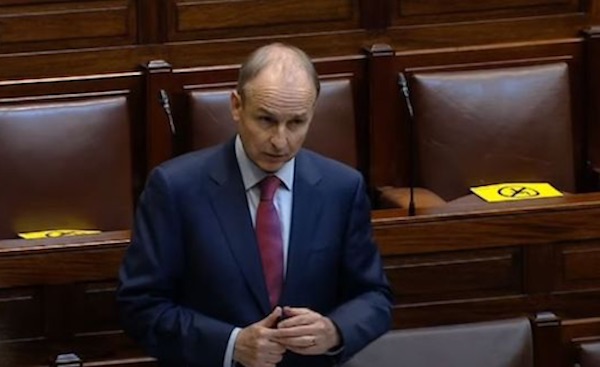
The head of the new coalition government in Dublin, Fianna Fáil leader Micheál Martin, has moved his party further away from its republican roots after casting doubt on a referendum on Irish unification as contained in the Good Friday Agreement.
A key aspect of the 1998 peace deal allows for the island to peacefully reunite, if a majority on both sides of the border support it. It was a critical element in appealing to nationalists and republicans at the time.
This week, Mr Martin was responding to questions in parliament when he declared the Good Friday Agreement was “about relationships” and that calls for a referendum were “divisive”.
Aontú leader Peadar Tóibín said he was “amazed” at the failure of the Taoiseach to affirm his commitment to accept a majority vote in favour of unification.
“The Good Friday clearly states that the constitutional location of the north of Ireland is based upon the majority will of the of the people of the north,” Mr Tóibín said.
“Despite decades of Fianna Fáil support for the majoritarian principle within the Good Friday Agreement, Mícheal Martin refused to commit to this principle.”
The Meath West TD said that if this is now the official policy of this government, then hardline unionists now hold a permanent veto over Irish self-determination.
In another exchange, Sinn Fein leader Mary Lou McDonald said a referendum on Irish unity is “imperative” to growing the Irish economy.
Speaking in the Dail, she said: “A united Ireland is the best idea for the future of our country. It is essential to the prosperity of all our people because growing our economy requires an all-Ireland approach.
But Mr Martin said a ‘shared island’ unit set up in his department will be focused on how to “develop a shared future”.
Mr Martin went into verbal somersaults to avoid the words ‘United Ireland’.
Mr Martin said the focus of the ‘shared island’ unit is to see how the Dublin government can “develop a shared future”.
He said: “I don’t believe precipitating or organising a referendum like that is the way to go.”
Sinn Féin’s Pádraig Mac Lochlainn described the refusal of the Taoiseach to advocate for a border poll - which is expressly provided for in the Good Friday Agreement - as “ridiculous”.
“Demand for Irish unity has been growing steadily over the last number of years and Sinn Féin have been pressing the Irish government to begin meaningful engagement with the British government to arrange a date for a referendum on Irish unity within the next five years,” he said.
“To plan for a United Ireland, we need an All-Ireland Forum or a Citizens Assembly to plan for constitutional change and to ensure that the path to reunification is inclusive and orderly, because it is reckless to refuse to plan for the future.
“By refusing to plan for unity, the Taoiseach is abdicating his responsibility as head of government. Those that press this view are acting foolishly and are not protecting or respecting any section of our people - unionist, nationalist or otherwise.
“Whilst Fianna Fáil occasionally pays lip service to its Republican roots, it has long since abandoned any desire to advocate for a United Ireland; particularly under Micheál Martin’s leadership.
“A referendum on Irish unity is expressly provided for in the Good Friday Agreement - despite what the Taoiseach thinks. This is an agreement that was endorsed by the people of this island, north and south, overwhelmingly over twenty years ago.
“Respecting that agreement must be the responsibility of the Irish government. Contradictory remarks about what the agreement says are deeply unhelpful, and quite frankly ridiculous.”
![[Irish Republican News]](https://republican-news.org/graphics/title_gifs/rn.gif)
![[Irish Republican News]](https://republican-news.org/graphics/title_gifs/harp.gif)

